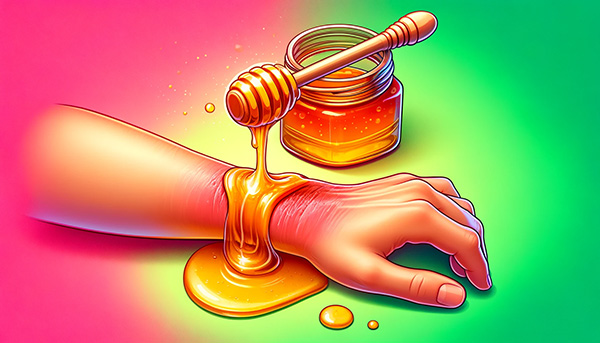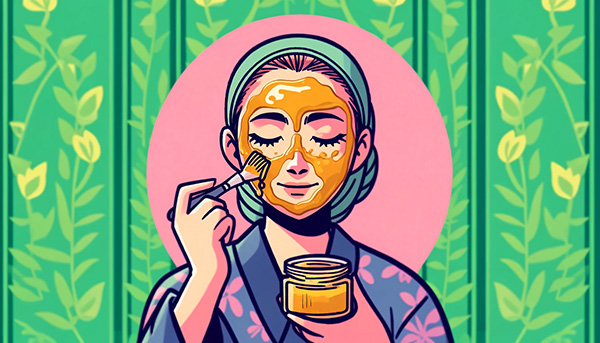Honey has been cherished for centuries as a natural elixir with numerous health benefits, and Manuka honey takes this reputation to a whole new level. This exceptional honey variety, derived from the nectar of the manuka tree in New Zealand, is not just your ordinary sweetener; it's a powerhouse of wellness for your body and a secret treasure for your skin.
But what is Manuka honey good for? What are its health benefits? In this post below, we'll explain what makes manuka honey different from other types of honey and how that unique manuka factor plays such a pivotal role in its health benefits!
Note: If you have a honey allergy or a bee allergy, you can experience an allergic reaction after ingesting or applying Manuka honey.
What Is Manuka Honey?
Manuka honey, also called tea tree honey, is exclusively produced from the nectar collected from the blossoms of the manuka bush (Leptospermum scoparium). This particular plant is indigenous to New Zealand. European honey bees can only pollinate these flowers two to six weeks out of the year when the manuka bushes bloom. This short blooming period and the high concentration of active compounds found in honey made only from manuka nectar explains the high price tag of genuine manuka honey compared to traditional local honey.
The distinctive feature distinguishing Manuka honey from other varieties is its remarkable composition, which incorporates powerful bioactive compounds such as methylglyoxal (MGO) and dihydroxyacetone (DHA). These compounds give Manuka honey its remarkable antibacterial, anti-inflammatory, and antioxidant properties.
The quality and potency of real Manuka honey are often indicated by its Unique Manuka Factor (UMF) rating or MGO rating. UMF measures the concentration of specific beneficial compounds, while MGO refers to methylglyoxal content. The greater the UMF or MGO rating, the more potent and beneficial the honey is perceived.
Because of its distinctive characteristics and limited availability, authentic and premium Manuka honey tends to be pricier than regular honey. To ensure you are getting authentic and the best Manuka honey, look for reputable brands that provide proof of authenticity, such as UMF certification or labeling by a licensed New Zealand company. While there is no limit on how much Manuka honey you can take if you have diabetes, talk to your doctors before adding it to your regimen.
Manuka Honey Vs. Traditional Honey

Traditional honey is made from nectar, which bees forage from various flowers. Manuka honey is made solely from the nectar of manuka flowers. Because the specific benefits of manuka flowers are concentrated in manuka honey, they enhance the properties already present in traditional honey, albeit to a smaller degree.
Manuka honey is darker and thicker than other types of honey. It looks grainy and has a consistency similar to molasses. This is partly because a significant portion of available manuka honey is unpasteurized. Raw honey of all types has a thicker consistency.
Although there are many health benefits to eating manuka honey, it does not have the benefit of reducing seasonal allergy symptoms by desensitizing you to the pollen of the area, as local honey can do.
15 Health Benefits Of Manuka Honey
Antibacterial Properties

Manuka honey is a powerful antibacterial! Natural honey has always been known for its antibacterial healing properties since the ancient Egyptian days. This is because of the naturally occurring hydrogen peroxide. However, manuka honey benefits from methylglyoxal as well!
Anti-Inflammatory Properties
Manuka honey contains flavonoid and polyphenol compounds that serve as powerful anti-inflammatories. Many standard medications that reduce inflammation, such as corticosteroids and NSAIDs, have significant adverse side effects. Studies have shown that the anti-inflammatory properties of manuka honey are on par with these medications in reducing inflammation, and they are more easily tolerated by the body.
Antioxidant Properties
The same polyphenolic compounds that give Manuka honey its anti-inflammatory properties also make it a strong antioxidant! Antioxidants fight against the unstable free radical molecules that cause chronic health problems.
Prebiotic Properties

Containing fructo-oligosaccharaides, manuka honey is an effective prebiotic! Prebiotics help support healthy gut bacteria, and manuka honey specifically stimulates the growth of lactobacillus and bifidobacterium. Additionally, manuka honey can inhibit the growth of a damaging bacteria known as Helicobacter pylori, which can cause indigestion, stomach ulcers, and gastric cancer.
Hydrating Properties

Manuka honey is deeply nourishing and hydrating to the skin due to its amino acids, fructose, and glucose. Besides being hydrating, it also operates as a humectant. Humectants pull water from the air down into the skin. This makes them hydrate in two ways - by using their own moisture and by pulling moisture from other sources.
Wound Healing
A combination of manuka honey's benefits—such as its antimicrobial and antibacterial properties and ability to maintain a hydrating and protective barrier—make it a superstar when it comes to wound treatment.
Medical-grade manuka honey can treat wounds of all types, ranging from typical scrapes to diabetic foot ulcers. Manuka honey plays a crucial role in the healing process by combatting existing wound infections originating from within and forming a protective barrier against external bacterial threats. Moreover, its ability to encourage healthy tissue regeneration expedites wound healing, clearing infection, and reduces the overall treatment duration.
Burn Healing

Manuka honey can treat burns and shorten healing times compared to traditional burn dressings. It serves a similar function as wound healing, but the benefits of manuka honey when it comes to tissue regeneration are particularly helpful with healing burns.
Oral Health
Many studies are showing that manuka honey is beneficial in supporting oral health. Its potent antibacterial properties actively fight against harmful oral bacteria that can lead to plaque build-up, periodontal disease, and tooth decay. Its anti-inflammatory properties help to decrease gum disease and inflammation. Manuka honey can be directly consumed, or you can use a manuka honey chew daily to prevent tooth decay.
Sore Throats

Eat manuka honey regularly or add it to a hot tea will dramatically soothe a sore throat. This is because of the anti-inflammatory effects of New Zealand manuka honey, which will reduce inflammation of the throat and prevent coughs. The antibacterial effects also help to fight against whatever cold or infection is causing the sore throat in the first place! All of this is particularly helpful for children, for whom many cold medications are either not suitable or ineffective.
Gut Health
Because manuka honey is a powerful prebiotic, consuming a tablespoon a day will promote a healthy gut microbiome and treat inflammatory bowel disease. Manuka honey provides a type of carbohydrate that we ourselves cannot digest, but our healthy gut bacteria can!
Skin Blemishes

The many health benefits of manuka honey are particularly helpful against various skin disorders. Raw honey is a beauty treatment that goes back thousands of years. Applying manuka honey to the skin or using facial creams that contain manuka honey as an active ingredient will treat acne, decrease inflammation from rosacea, hydrate the skin, and provide a general antibacterial effect to reduce blemishes.
Antibiotic-Resistant Infections
Antibiotic-resistance is becoming a larger and larger issue in the medical field. Scientific research has demonstrated that the consumption of manuka honey is particularly effective against methicillin-resistant Staphylococcus aureus (MRSA). MRSA infections can be deadly if not affected by antibiotics, so it is encouraging that manuka honey appears to be able to fight against this harmful bacteria.
Stomach Ulcers
Gastric ulcers are sores that develop on the stomach lining, causing significant stomach pain and discomfort. Manuka honey benefits patients struggling with gastric ulcers in many ways. It reduces inflammation, fights infection caused by H. pylori bacteria, and increases the amount of certain enzymes that repair oxidative damage.
Cystic Fibrosis
Manuka honey's antibacterial properties can help manage the negative side effects of antibiotics in cystic fibrosis patients who tend to develop upper respiratory infections. Pseudomonas aeruginosa and Burkholderia cepacia are the typical microbes responsible for these potentially deadly infections for these patients. Manuka honey is extremely effective in killing these specific bacteria.
Acne

Manuka Honey's high concentration of methylglyoxal gives it potent antimicrobial activity, targeting acne-causing bacteria on the skin. Manuka honey's anti-inflammatory properties help reduce redness and irritation associated with acne, promoting healing and preventing further breakouts. Its osmotic effect draws moisture from the environment, hydrating the skin while removing impurities and dead cells, thus unclogging pores. Applying Manuka honey topically can accelerate the healing process of acne lesions, reduce infection risk, and support the skin's regenerative processes, leading to clearer, healthier skin.

